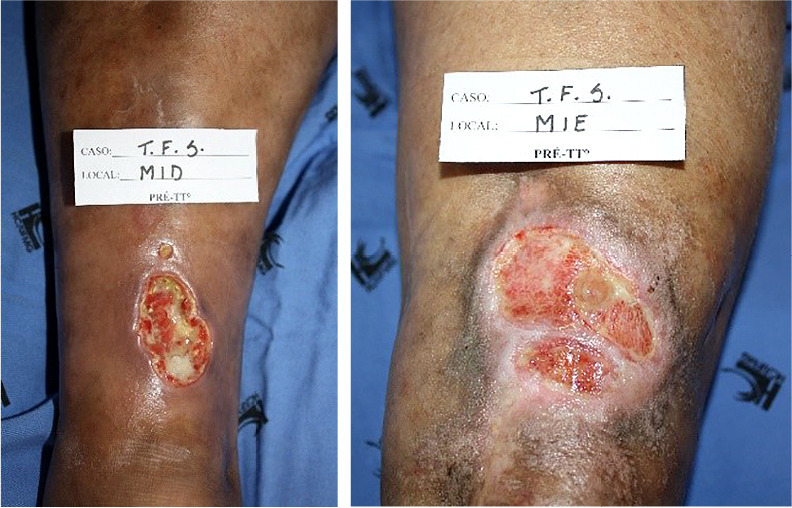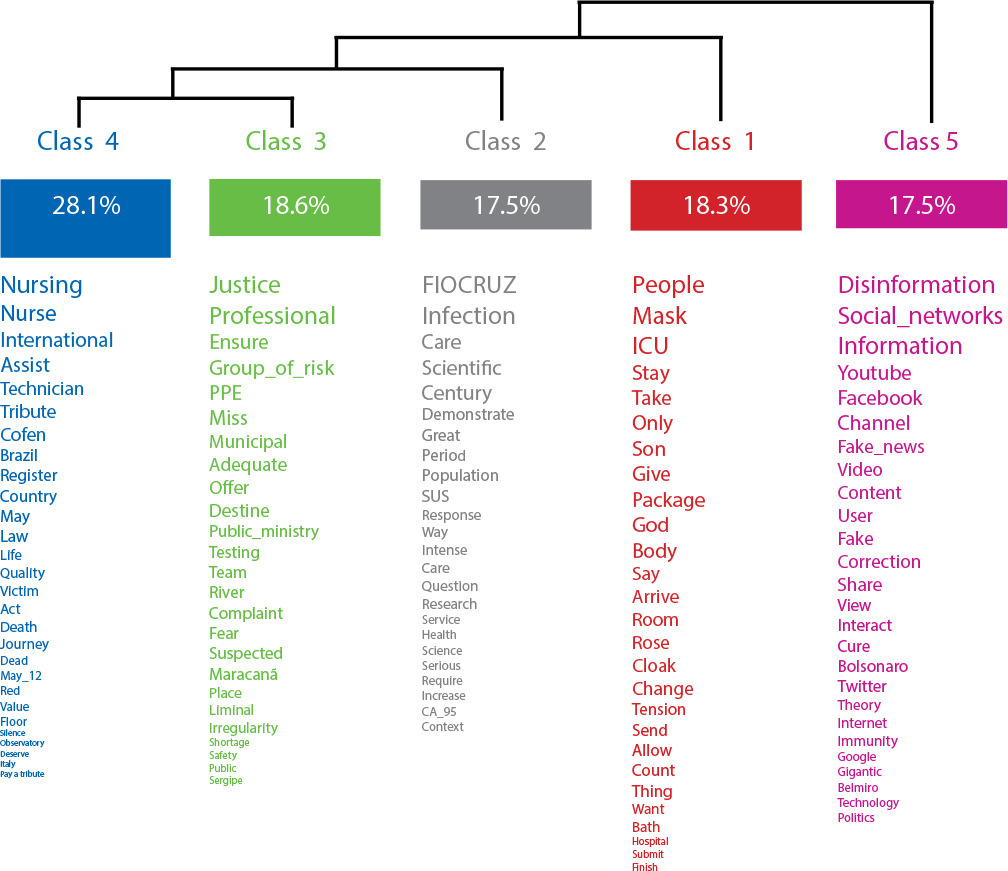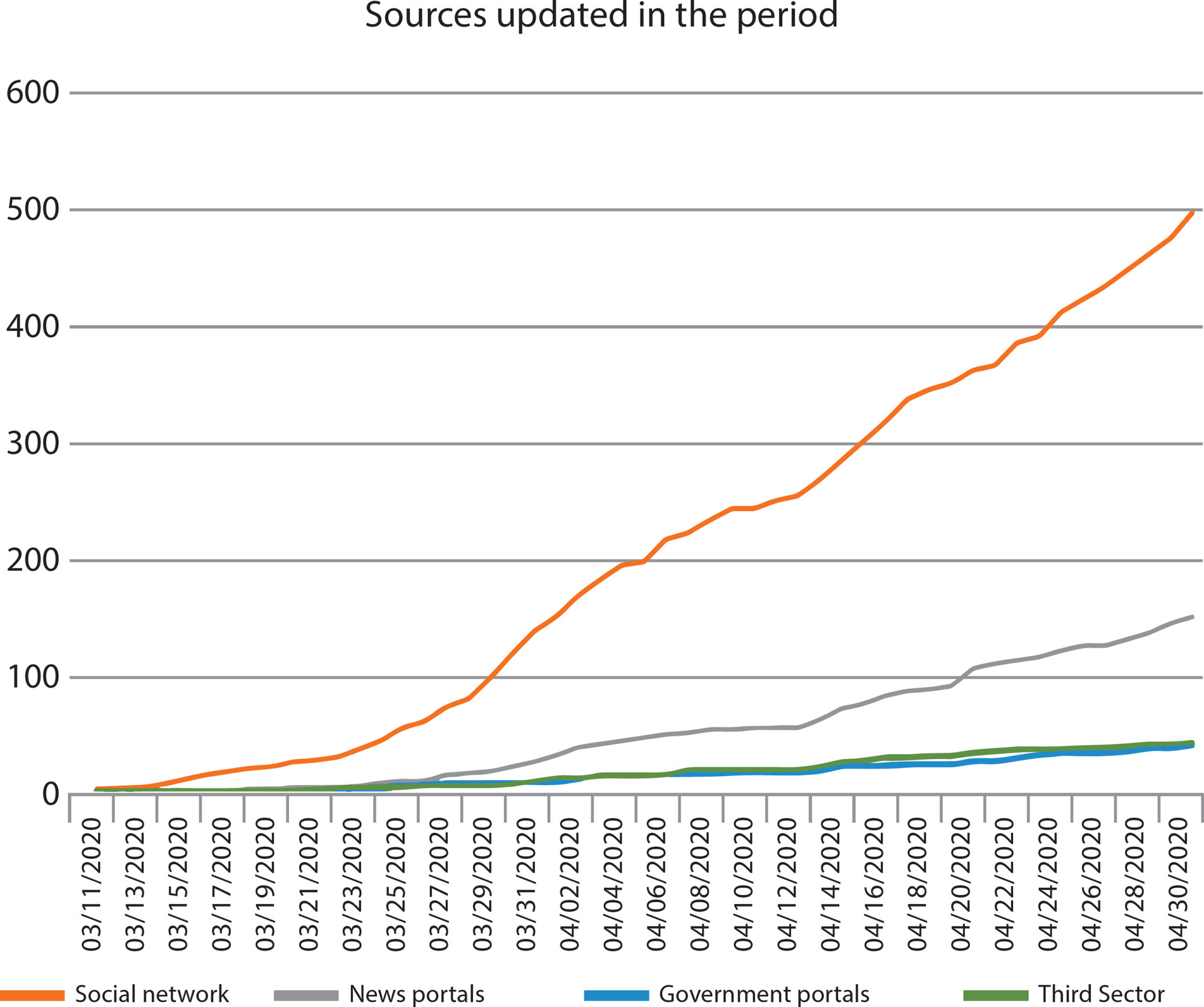-
EXPERIENCE REPORT10-25-2022
Patients who experience systemic lupus erythematosus and leg ulcer: phenomenological approach
Revista Brasileira de Enfermagem. 2022;75(2):e20200081
Abstract
EXPERIENCE REPORTPatients who experience systemic lupus erythematosus and leg ulcer: phenomenological approach
Revista Brasileira de Enfermagem. 2022;75(2):e20200081
DOI 10.1590/0034-7167-2020-0081
Views0See moreABSTRACT
Objective:
To understand the experience of a woman with systemic lupus erythematosus and leg ulcers with cutaneous calcinosis.
Methods:
An experience report based on the social phenomenology of Alfred Schutz, conducted with a young woman undergoing treatment in an outpatient service.
Results:
The disease manifested itself in adolescence and brought emotional instability associated with body image concern and social isolation. The discontinuation of the studies triggered financial limitations with implications for treatment. The presence of ulcers aggravated by skin calcification makes the process of getting sick tiring and painful. Interpersonal relationships are resources for coping with situations experienced.
Final considerations:
Patients with lupus may have social, affective, and family life, even in the face of the limitations imposed by the disease. However, the emergence of leg ulcer with calcinosis changes this situation.

-
ORIGINAL ARTICLE10-25-2022
COVID-19 pandemic and nursing week: analysis from software Iramuteq
Revista Brasileira de Enfermagem. 2022;75:e20200690
Abstract
ORIGINAL ARTICLECOVID-19 pandemic and nursing week: analysis from software Iramuteq
Revista Brasileira de Enfermagem. 2022;75:e20200690
DOI 10.1590/0034-7167-2020-0690
Views0See moreABSTRACT
Objective:
to analyze the themes of publications on the Federal Council of Nursing (Cofen) website during Nursing Week 2020.
Method:
documentary, qualitative research, whose data sources were publications on the Cofen website from May 12 to 20, 2020. Data were processed by software IRAMUTEQ®, through the Descending Hierarchical Classification and analyzed under the historical materialism framework.
Results:
thirty publications were analyzed, giving rise to five classes.
Final considerations:
the themes published in the period investigated pointed to the grief experienced by the category, due to the death of its members, and the fight for better working conditions. Overcoming the pandemic involves recognizing science and the Unified Health System, protecting nursing workers’ health and fighting misinformation and fake news.

-
ORIGINAL ARTICLE10-25-2022
Online mental health care during the COVID-19 pandemic
Revista Brasileira de Enfermagem. 2022;75:e20210554
Abstract
ORIGINAL ARTICLEOnline mental health care during the COVID-19 pandemic
Revista Brasileira de Enfermagem. 2022;75:e20210554
DOI 10.1590/0034-7167-2021-0554
Views0See moreABSTRACT
Objective:
Identify users, services, and reasons for seeking online mental health care during the COVID-19 pandemic.
Methods:
A descriptive, retrospective study, with documentary analysis of medical records of users served between April and July 2020.
Results:
Of the 258 accesses, 159 were complete, and 99 were offline messages. Although there were 61 (38.36%) consultations in May, in April, there were 49 (30.82%) in 18 days of reception. More than 89% of accesses were women between 40 and 59 years. Among the motivations in the search for care, anxiety, fear, depression, sadness, crying, stress, and suicidal ideation stand out.
Final considerations:
Chat is a quick, early and short-wait intervention opportunity for people in need of mental health care. Therefore, the study emphasizes the importance of investing in the training of nursing professionals to act in mental health.

-
ORIGINAL ARTICLE10-25-2022
Planned home birth assistance: challenges during the COVID-19 pandemic
Revista Brasileira de Enfermagem. 2022;75:e20210083
Abstract
ORIGINAL ARTICLEPlanned home birth assistance: challenges during the COVID-19 pandemic
Revista Brasileira de Enfermagem. 2022;75:e20210083
DOI 10.1590/0034-7167-2021-0083
Views0See moreABSTRACT
Objective:
To understand the challenges faced by urban midwives in assisting planned home births during the COVID-19 pandemic.
Methods:
Qualitative study, based on the Collective Subject Discourse methodological framework, carried out with eight professionals, members of a birth care collective from the northeast region of Brazil. Data was collected between September and October of 2020 using the focus group technique.
Results:
The collective discourses revealed five central ideas: Changing assistance strategy; Dealing with frustration; Facing the fear of contamination; Avoiding exposure to the virus; and Keeping distance during the care process.
Final considerations:
The challenging condition the pandemic brings to the care of planned home births is made evident, being marked by the need for collective protection and the pressure of following health recommendations. The study also points out the need for official protocols and good quality information based on scientific evidence and humanizing principles to guide health care.
-
ORIGINAL ARTICLE10-25-2022
Brazilian nursing in pandemic times and the bicentennial of Florence Nightingale
Revista Brasileira de Enfermagem. 2022;75:e20210081
Abstract
ORIGINAL ARTICLEBrazilian nursing in pandemic times and the bicentennial of Florence Nightingale
Revista Brasileira de Enfermagem. 2022;75:e20210081
DOI 10.1590/0034-7167-2021-0081
Views0See moreABSTRACT
Objective:
To reflect on the role of Brazilian nursing during the COVID-19 pandemic, considering as a historical landmark the bicentenary of the birth of Florence Nightingale, a precursor of modern nursing, celebrated in 2020.
Method:
Theoretical-reflective study, based on Florence Nightingale’s environmental theory through a literature review, carried out in international and national virtual news from different sources and added to the authors’ experiences related to the pandemic.
Results:
It was possible to identify the weaknesses experienced by nurse practitioners as to contagion by COVID-19, the routine of exposure to risks, the lack of adequate protection in many scenarios, the high rates of illness, and also deaths that occurred in this profession.
Final considerations:
Florence Nightingale’s Environmental Theory describes the importance of the adequacy of the work environment. It also emphasizes the value of this professional for contemporary nursing and the redefinition of this professional category during the COVID-19 pandemic.
-
ORIGINAL ARTICLE10-24-2022
Avoidable deaths in the first 24 hours of life: health care reflexes
Revista Brasileira de Enfermagem. 2022;75(1):e20220027
Abstract
ORIGINAL ARTICLEAvoidable deaths in the first 24 hours of life: health care reflexes
Revista Brasileira de Enfermagem. 2022;75(1):e20220027
DOI 10.1590/0034-7167-2022-0027
Views0See moreABSTRACT
Objectives:
to analyze the risks of deaths in the first 24 hours of life and their preventable causes.
Methods:
cross-sectional study carried out in Pernambuco, Northeast of Brazil, between 2000-2019, with mortality and live birth data. The avoidability was analyzed through the Brazilian List of Avoidable Causes of Deaths due to Interventions of the Unified Health System. For the statistical analyses, Pearson’s chi-squared test and relative and attributable risks were used.
Results:
13,601 deaths were registered, of which 10,497 (77.19%) were from preventable causes. Of the total, 5,513 (40.53%) were reducible through adequate care for women during pregnancy. The lower the gestational age, birth weight and education level, the higher the relative and attributable risk of death in the first 24 hours of life.
Conclusions:
most of the deaths were considered avoidable and with high relative and attributable risks. These early deaths suggest care failures and the need to reinforce prevention and treatment measures.
-
ORIGINAL ARTICLE10-24-2022
Factors associated with symptoms of physical and emotional burden in informal caregivers of the elderly
Revista Brasileira de Enfermagem. 2022;75:e20210927
Abstract
ORIGINAL ARTICLEFactors associated with symptoms of physical and emotional burden in informal caregivers of the elderly
Revista Brasileira de Enfermagem. 2022;75:e20210927
DOI 10.1590/0034-7167-2021-0927
Views1See moreABSTRACT
Objectives:
to analyze the personal and work-related burden factors associated with physical and emotional symptoms of informal caregivers of the elderly.
Methods:
cross-sectional study conducted with 121 informal caregivers and 121 seniors who received care, assessed individually for the risk of: physical overload, musculoskeletal symptoms, Self-Reporting Questionnaire, effort perception, and Katz index.
Results:
a greater perception of effort raises up to 3.3 times the chances of presenting symptoms of pain in the spine region (p=0.01), and lower functional capacity of the elderly increases up to 1.3 times the chances of presenting pain symptoms in the spine region (p=0.02). The symptoms of emotional overload were associated with the caregiver’s low income (p=0.02).
Conclusions:
the perception of effort, dependence of the elderly, caregiver’s age, and symptoms of emotional overload are involved with caregivers’ symptoms of physical overload, and low income, with emotional overload.
-
ORIGINAL ARTICLE10-24-2022
Development and testing of the Prev’Quedas game for older adults in the community: a descriptive study
Revista Brasileira de Enfermagem. 2022;75:e20220098
Abstract
ORIGINAL ARTICLEDevelopment and testing of the Prev’Quedas game for older adults in the community: a descriptive study
Revista Brasileira de Enfermagem. 2022;75:e20220098
DOI 10.1590/0034-7167-2022-0098
Views0See moreABSTRACT
Objectives:
to develop and test a board game for fall prevention in older adults in the community.
Methods:
a descriptive study, carried out through the use of game design elements (narrative, mechanics, aesthetics and technology), the Health Promotion Model, assessment by experts and testing with older adults. For assessment, the Concordance Index was used, considering it greater than 80%.
Results:
three prototypes and the final version were developed. The game’s narrative was based on promotion model, comprising individual aspects, benefits and barriers in behavior to prevent falls. The mechanics outlined goals and rules. Aesthetics encompassed layout and illustrations. The technology involved board, cards, pin, roulette and instruction manual. The game was assessed by 36 experts and 31 older women from the community, with a Concordance Index of 93.22% and 99%, respectively.
Conclusions:
the game developed and tested was considered an adequate educational strategy for fall prevention.

-
ORIGINAL ARTICLE10-21-2019
Religious/spiritual coping and spiritual distress in people with cancer
Revista Brasileira de Enfermagem. 2019;72(6):1534-1540
Abstract
ORIGINAL ARTICLEReligious/spiritual coping and spiritual distress in people with cancer
Revista Brasileira de Enfermagem. 2019;72(6):1534-1540
DOI 10.1590/0034-7167-2018-0585
Views0See moreABSTRACT
Objective:
To investigate the relation between the presence of spiritual distress and use of RSC and sociodemographic, clinical and religious/spiritual variables in people with cancer.
Method:
Cross-sectional study conducted in an association for support to people with cancer. The data obtained with the tools were analyzed using the Spearman‘s correlation coefficient and the Mann-Whitney Test.
Results:
129 volunteers participated in the study, of which 57% showed moderate spiritual distress, 96% used medium and high positive religious/spiritual coping. Spiritual distress showed positive correlation with negative religious/spiritual coping (P<0.001) and inverse correlation with age (p 0.002). The use of positive religious coping was statistically significant in people who have religious practices (p 0.001).
Conclusão:
Spiritual distress is a phenomenon that is present in the lives of people with cancer and has significant relation with the use, in a negative manner, of religion/spirituality as a way of coping with the disease.
-
ORIGINAL ARTICLE09-16-2019
Social incentives for adherence to tuberculosis treatment
Revista Brasileira de Enfermagem. 2019;72(5):1182-1188
Abstract
ORIGINAL ARTICLESocial incentives for adherence to tuberculosis treatment
Revista Brasileira de Enfermagem. 2019;72(5):1182-1188
DOI 10.1590/0034-7167-2017-0654
Views0See moreABSTRACT
Objective:
To analyze the influence of social incentives for adherence to tuberculosis (TB) treatment.
Method:
Qualitative study, in which 26 primary health care professionals of São Paulo were interviewed in 2015.Their testimonies were submitted to the speech analysis technique. The theoretical reference was the social determination of the health-disease process. Ethical procedures were observed.
Results:
TB is related to precarious living conditions. Incentives such as the basic food basket and transportation stipends are relevant for patients’ adherence to treatment, as well as to the create bonds between the patient and the health team.
Final considerations:
The incentives strengthened adherence to TB treatment. However, interventions in the context of public measures must transcend the remedial dimension and be guided towards the transformation of the TB situation, which means supporting processes that modify living conditions.
-
ORIGINAL ARTICLE07-01-2020
Homeless population: characterization and contextualization by census research
Revista Brasileira de Enfermagem. 2020;73(5):e20190236
Abstract
ORIGINAL ARTICLEHomeless population: characterization and contextualization by census research
Revista Brasileira de Enfermagem. 2020;73(5):e20190236
DOI 10.1590/0034-7167-2019-0236
Views0See moreABSTRACT
Objectives:
to analyze characteristics of homeless people and factors associated with living on the streets.
Methods:
a census-type sectional survey carried out between 2015 and 2018, in the municipality of Maringá-Paraná. A total of 701 homeless answered a structured questionnaire with sociodemographic data, living conditions, and drug use. We used Pearson’s correlation test for the association analysis of the variables at a 95% confidence level.
Results:
men (90.7%) the average age of 37.7 years had been homeless for an average of 5.39 years. Most had little education (54.2%), and homelessness was due to drug use (47.2%) and family disagreements (38.9%).
Conclusions:
drug use and family disagreements were the main reasons for homelessness. Time on the street, gender, and drugs were associated with a negative correlation to be homeless; and age, mean daily income, the number of daily meals, having been in prison, and having an income source were associated with positive correlation.
-
REFLECTION05-03-2021
Florence Nightingale’s theory and her contributions to holistic critical thinking in nursing
Revista Brasileira de Enfermagem. 2021;74(2):e20200139
Abstract
REFLECTIONFlorence Nightingale’s theory and her contributions to holistic critical thinking in nursing
Revista Brasileira de Enfermagem. 2021;74(2):e20200139
DOI 10.1590/0034-7167-2020-0139
Views0See moreABSTRACT
Objective:
to reflect on Florence Nightingale’s legacy and describe her contributions to critical holistic thinking in nursing.
Methods:
this is a theoretical reflection, for which scientific productions on Florence Nightingale’s environmental theory, as published in national and international journals, were based.
Results:
Florence Nightingale’s philosophy and teachings emphasize that the nurse must use her brain, heart and hands to create healing environments to care for the patient’s body, mind and spirit. Nursing, since the time of Nightingale, has been building the holistic paradigm, in all schools of thought, with a view to a humanistic approach to the human being in their indivisible relationship with the environment.
Final considerations:
Florence’s contributions to holistic critical thinking in nursing are evident, constituting nurses’ differential in clinical practice.
-
REVIEW06-26-2023
Barriers to Pre-Exposure Prophylaxis (PrEP) use for HIV: an integrative review
Revista Brasileira de Enfermagem. 2023;76(3):e20210963
Abstract
REVIEWBarriers to Pre-Exposure Prophylaxis (PrEP) use for HIV: an integrative review
Revista Brasileira de Enfermagem. 2023;76(3):e20210963
DOI 10.1590/0034-7167-2021-0963
Views0See moreABSTRACT
Objectives:
to identify and synthesize scientific evidence on the barriers and difficulties for Pre-exposure Prophylaxis (PrEP) use and compliance for HIV.
Methods:
an integrative literature review, using the MEDLINE/PubMed, Cumulative Index to Nursing and Allied Health Literature (CINAHL), Academic Search Premier and Scopus (Elsevier) databases.
Results:
all (100%) the articles included identified that PrEP users experience some type of structural barrier related to health services such as long distance from the units, suboptimal logistics for taking pills and professional resistance to prescribing PrEP. Furthermore, 63.21% identified social barriers, such as stigma about sexuality and HIV, in addition to individual barriers such as alcohol use, adverse effects, and concerns about long-term toxicity.
Conclusions:
the barriers to PrEP use are multifactorial. Effective interventions are needed to support PrEP users in accessing, complying with, and retaining health services.

-
11-13-2020
Fear of childbirth in time of the new coronavirus pandemic
Revista Brasileira de Enfermagem. 2020;73:e20200551
Abstract
Fear of childbirth in time of the new coronavirus pandemic
Revista Brasileira de Enfermagem. 2020;73:e20200551
DOI 10.1590/0034-7167-2020-0551
Views0See moreABSTRACT
Objective:
Reflect on how the new coronavirus pandemic triggered or accentuated the fear of childbirth in pregnant women and affected childbirth care practices.
Methods:
Reflective analysis of women’s pregnancy and childbirth experiences during the current pandemic, supported by the latest scientific evidence and recommendations on the topic.
Results:
Pregnancy and childbirth are life-changing events for women, but during the new coronavirus pandemic, fear and uncertainty have taken on an unprecedented dimension in the negative way that many pregnant women have anticipated and experienced childbirth.
Final considerations:
The current period has accentuated a chronic problem: a paternalistic system of health institutions in the approach to childbirth, dense with additional levels of fear in pregnant women. In this context, addressing the fear of childbirth means not giving up the promotion of safe and positive birth experiences for women.

-
EXPERIENCE REPORT10-26-2020
Brazilian Nursing Process Research Network contributions for assistance in the COVID-19 pandemic
Revista Brasileira de Enfermagem. 2020;73:e20200798
Abstract
EXPERIENCE REPORTBrazilian Nursing Process Research Network contributions for assistance in the COVID-19 pandemic
Revista Brasileira de Enfermagem. 2020;73:e20200798
DOI 10.1590/0034-7167-2020-0798
Views0See moreABSTRACT
Objective:
to describe the theoretical construction process of nursing process support documents in COVID-19 care scenarios.
Methods:
an experience report of the joint activity of the Brazilian Nursing Process Research Network (Rede de Pesquisa em Processo de Enfermagem) composed of Higher Education and Health Institution researchers in Brazil.
Results:
five instruments were organized collectively, involving the elements of nursing practice (nursing diagnoses, outcomes and interventions) in assistance for community; for patients (with suspected or mild, moderate, and critical COVID-19 and residents in Nursing Homes); for nursing workers’ health support, also subsidizing registration and documentation during the COVID-19 pandemic.
Final considerations:
valuing the phenomena manifested by families/communities, patients and health professionals is essential for early detection, intervention, and prevention of diseases.
-
01-29-2021
Domestic violence against women amidst the pandemic: coping strategies disseminated by digital media
Revista Brasileira de Enfermagem. 2021;74:e20200631
Abstract
Domestic violence against women amidst the pandemic: coping strategies disseminated by digital media
Revista Brasileira de Enfermagem. 2021;74:e20200631
DOI 10.1590/0034-7167-2020-0631
Views0See moreABSTRACT
Objective:
to know the strategies to cope with domestic violence against women disseminated by digital media at the beginning of the COVID-19 pandemic.
Methods:
a documentary study with a qualitative approach. The search took place from March 11 to April 30, 2020, from four sources: newspapers and online portals, social network, official government pages and third sector portals. Thematic content analysis of the findings was performed.
Results:
seventy-seven strategies were identified in the journalistic press, 93 in the social network, 45 in government portals and 40 in third sector organizations. From analysis, three empirical categories emerged: Strategies for communication with women; Strategies adopted by customer service; Strategies to inform the population.
Final considerations:
most of strategies were adaptations of existing services, centered on the reporting of violence by women

Search
Search in:
Nuvem de Tags
Adolescente (85) Atenção Primária à Saúde (239) COVID-19 (91) Criança (91) Cuidados de Enfermagem (269) Educação em Enfermagem (151) Educação em Saúde (139) Enfermagem (930) Enfermagem Pediátrica (86) Estudantes de Enfermagem (77) Estudos de Validação (131) Família (87) Idoso (208) Promoção da Saúde (99) Qualidade de Vida (104) Saúde do Trabalhador (86) Saúde Mental (145) Saúde Pública (82) Segurança do Paciente (150) Tecnologia Educacional (100)



